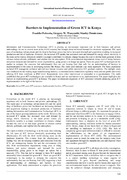| dc.contributor.author | Wabwoba, Franklin | |
| dc.contributor.author | Wanyembi, Gregory W. | |
| dc.contributor.author | Omuterema, Stanley | |
| dc.date.accessioned | 2019-03-21T17:04:28Z | |
| dc.date.available | 2019-03-21T17:04:28Z | |
| dc.date.issued | 2012 | |
| dc.identifier.issn | 2224-3577 | |
| dc.identifier.uri | http://erepository.kibu.ac.ke/handle/123456789/324 | |
| dc.description.abstract | Information and Communication Technology (ICT) is playing an increasingly important role in both business and private undertakings. Its use in several areas in the world economy has brought about increased demand for electronic equipment. The rapid pace of technology advancement and the drop in hardware prices has led to increased demand and acquisition resulting in increased production and use of hardware. However, the increased ICT uptake has increased costs and demand for energy where electricity is the main power source. Electricity notably is a major contributor to climatic change because the coal or oil that helps generate it does releases carbon dioxide, pollutants, and sulphur into the atmosphere. With environmental degradation, rising costs of doing business and power demand and demand for social responsibility, going green is no longer an option. There are green ICT technologies in the market to mitigate the concerns but unfortunately they are not bearing fruit that calls for an understanding of barriers to implementation of the same in developing nations like Kenya. The study used multiple case study approach. The study population included ICT managerial, technical and end user human resource and public university ICT graduate students. The multiple study was conducted in one leading sugar manufacturing industry, a communication commission regulatory body and one public university offering ICT from certificate to PhD level. Respondents were either interviewed or responded to a questionnaire. The study established that green ICT technologies are available in Kenya and are not barriers to its implementation. The paper highlights the barriers to implementing green ICT in Kenya. The paper recommends alignment of ICT personnel towards enhancing green ICT implementation in the light of the barriers. | en_US |
| dc.language.iso | en | en_US |
| dc.publisher | International Journal of Science and Technology | en_US |
| dc.rights | Attribution-NonCommercial-ShareAlike 3.0 United States | * |
| dc.rights.uri | http://creativecommons.org/licenses/by-nc-sa/3.0/us/ | * |
| dc.subject | Green ICT | en_US |
| dc.subject | green ICT awareness | en_US |
| dc.subject | Implementation barriers | en_US |
| dc.subject | ICT personnel | en_US |
| dc.title | Barriers to implementation of green ICT in Kenya | en_US |
| dc.type | Article | en_US |

